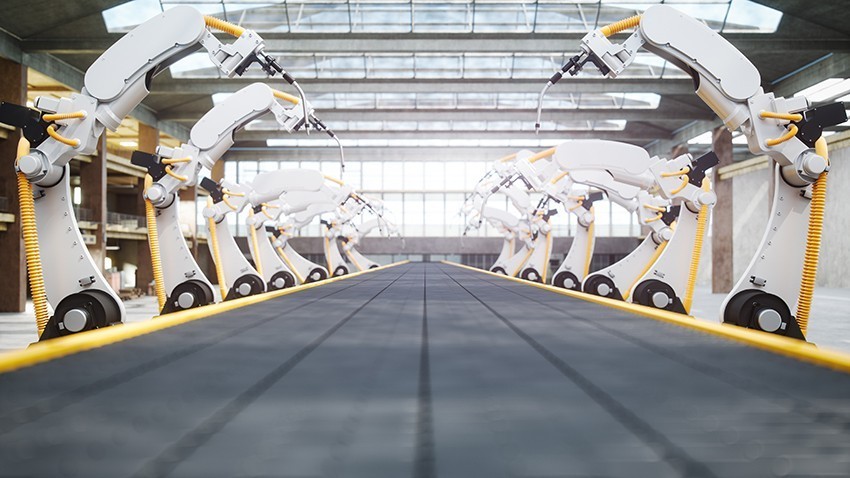Much has been written and published about Industry 4.0 – the fourth industrial revolution, which is focused on new technologies, such as drones, autonomous vehicles and robotic capabilities in today’s smart factories. What are the effects of these new technologies on today’s operations?
Smart factories utilize robots to perform tasks with little or no human interaction. They can vary significantly in functionality, mobility, dexterity, intelligence and cost. They may automate simple, repetitive tasks, or take the form of flying vehicles (drones) capable of recognizing, learning and making decisions independently, based on the information presented to them.
Utilizing robots in your operations can provide a number of benefits:
- Reductions in errors
- Improved safety
- Improved efficiency
- Increased speed of production
- Ability to operate in dangerous environments
Until recently, robots were limited to replacing those tedious, repetitive tasks people did not want to do. Now technology has advanced to a stage, however, where robots are capable of performing much more complex tasks and many work alongside their human counterparts.
The benefits of utilizing robots in your operations are rapidly increasing. Robots are becoming more flexible, they require less time and technical expertise to install and the cost of deploying them is decreasing. On the factory floor, the benefits are immediately obvious: a robot does not require breaks and can work around the clock without stopping. For companies in a state of expansion, robots can provide a very good option to increase capacity and cope with extraordinary seasonal demands. The value of utilizing them in your operations will only increase with time.
Drones are another technology that many businesses are rapidly favoring. The use cases for drones have increased recently, with many new applications being developed. The drone industry is expected to be worth $10 billion by 2021, moving from its predominantly military usage to much wider applications.
The applications for drones in your operations are many and varied:
- Warehouse operations, transporting materials from storage to the factory floor and moving finished products from production to shipping. These will significantly reduce labor costs.
- Drones are frequently used in the telecoms industry where they can conduct site audits quickly and efficiently, providing top-down views and line-of-sight inspections.
- Drones are in wide use in the real estate industry where they can provide high-quality imagery of properties for marketing purposes.
- During emergency situations, drones are capable of delivering critical supplies when traditional transport options are unavailable.
- Drones are used in agricultural industries, monitoring stock and crop conditions.
- Consumer delivery services is a prospective use for drones and actively being developed.
The quality of drones and the technology that drives them is increasing rapidly and we can expect them to assume a larger role in industry during the coming years.
Another technology that is receiving considerable media attention is autonomous, or self-driving, vehicles. There are approximately 16 billion tons of goods shipped across the US every year by truck. Much effort is being made to develop technology that will allow autonomous vehicles to be a part of this delivery chain.
Many large industries and municipal governments are driving research and development into autonomous-vehicle research because they want to benefit from the new options the technology can provide. In addition, many start-ups want to be first to market those options. All are looking to develop automated transportation of raw materials, components and finished products via the country’s network of roads.
It seems unlikely that fully automated 18-wheelers in large numbers will appear on our roads in the immediate future for a number of reasons: The technology is not fully developed yet, the transportation infrastructure is not ready, the public has major concerns about the safety of autonomous vehicles and, probably most significantly, the transport industry is a major employer, so the displacement of drivers and other workers is a major consideration.
Regardless of these concerns, however, the technology is actively being developed and it is expected that autonomous, long-haul trucking could save manufacturers approximately 30 percent of their transport costs by 2040.
The fourth industrial revolution has already started and will provide major improvements to the profitability of manufacturing operations. Exercising caution is required when adopting these exciting new technologies, however. There is a significant human cost involved and we must be mindful of that cost.
Kepner-Tregoe has been the industry leader in manufacturing consulting, problem facilitation and training for over 60 years, working with companies around the globe and across industries to solve some exciting (and sometimes scary) problems and provide employees with the skills they need to confidently deliver results. Kepner-Tregoe’s experience-based learning methods integrating tools such as simulation, coaching and mentoring, have led to countless success stories for companies just like yours.



